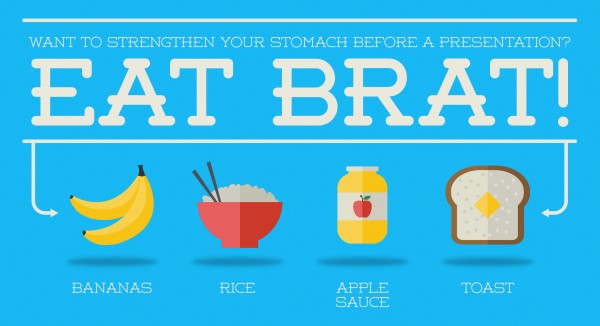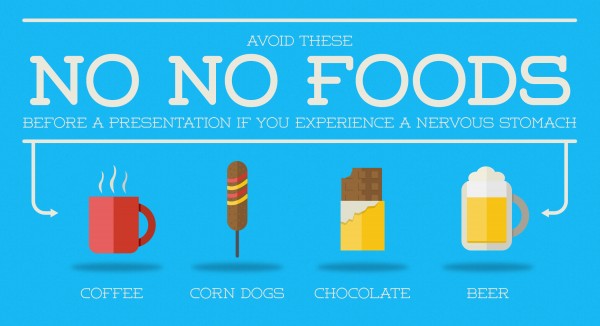If it’s true that people fear presenting more than death, then presenters can anticipate a whole host of survival instincts to kick in before their “big moment.” One such “natural” instinct includes a nervous stomach, which can be an unpleasant side effect of nerves working on overtime. How does our fear of public speaking translate into agonizing stomach pain? And more importantly, how can presenters fix it?
The Science of “Why”
“The gut is called the little brain — it’s the largest area of nerves outside the brain.” – Francisco J. Marrero, MD, a gastroenterologist with the Digestive Disease Institute at the Cleveland Clinic.
You can consider the brain to be an especially cranky King with a bad temper. At his slightest whim, subjects go running. Now consider your stomach to be the Queen, and the connection between the two especially powerful. The connection is known as the enteric nervous system, which sends chemical messengers AKA “neurotransmitters” between the two rulers. Nine times more messages are sent from the Queen Stomach than from the King Brain. So when the King is unhappy, the Queen suffers. And you experience knots, agony, and a whole host of embarrassing side effects. The King is affected by emotional changes, stress, anxiety, and depression…all of which can occur before a presentation.
Dr Marerro continues: “Any time you’re in a stressful situation, a lot of people will get butterflies in their stomach or may get diarrhea. It gets better when they get out of that stressful situation.”
You can thank your cranky King Brain for the physical response, as well as a powerful enteric system. What function does this serve in our body? When anxiety occurs, blood is diverted away from the stomach towards the muscle tissues. This happens in order to supply oxygen that supports our “fight or flight” response. The muscle tissues around the digestive tract become active and affected, and voila! A recipe for pain.
Maybe in our distant past, a bodily response to anxiety helped us hunt woolly mammoths for dinner, but it’s not so helpful before a presentation. You might experience one (or all) of the following symptoms:
Churning stomach
“Butterflies” in your stomach
Cramps
Nausea
A strange taste in your mouth
Vomiting
Diarrhea
Increased pulse rate
Cold sweat
The body is a wonderful, occasionally painful thing. Now that you know why it occurs, let’s explore some solutions that can be done in preparation for your presentation.
Long-Term Diet Solutions
If a nervous stomach is something you regularly face, you might consider revising your eating habits. Digestive care means fueling your body with food that is easy for it to handle, and is healthy for the body overall. This includes:
Cutting out high-fat, fried, processed, overly salty, and bad-for-you foods
Eating high-fiber foods such as vegetables and whole grains
Eating lean cuts of meat and fish
Drinking plenty of water to stay hydrated
Eating foods more slowly, making sure to thoroughly chew.
You may also consider taking an enzyme supplement with meals, especially if you have sensitivity to lactose or other foods. Our bodies produce natural digestive enzymes to break down food, and they also exist in the foods we eat. However, if we aren’t eating enough fresh ingredients due to our busy lifestyle, taking a natural supplement can help.
“Supplementation allows more of the body’s own enzymes to perform other important tasks, including sending enzymes into the circulatory system where they can help break down larger, undigested food fragments that have breached the membrane of the digestive tract. If allowed to reach the blood vessels, these fragments can cause allergies, inflammation and other health complications.” – Brenda Watson, author of Healthy Living
It seems like an obvious solution: eat better. But in seriousness, eating nothing but cheese pizza in the months before a presentation is probably not going to help you any. Eat some fiber! Drink some water! You may be surprised by the results.
Pre-Presentation Solutions: The BRAT Diet
In the event that you have eaten nothing but cheese pizza your whole life and don’t have time to engage in a healthy lifestyle before your presentation, don’t worry. You can make day-of changes that will help ease a nervous stomach.
One such method is the famous BRAT Diet, which is a mnemonic for Bananas, Rice, Applesauce and Toast. This bland-food method is comprised of low-fiber foods that have a “binding” effect on the digestive tract. It is often recommended for people suffering from the stomach flu, but can also have a soothing effect before a big, terrifying event like a presentation.
Why does it work? All of the “ingredients” in the BRAT diet are composed of soluble fibers. These “good” fibers have a property known as “viscosity,” which slow the movement of food through the GI (gastrointestinal) tract by forming a gel when mixed with water. For instance, Pectin is an example of a soluble fiber which is found in applesauce. Insoluble fibers don’t dissolve in water and cause food to move faster through the GI tract, potentially causing problems.
The BRAT diet doesn’t contain enough nutritional diversity for a long-term solution. However, you can prepare your stomach for a big event by eating BRAT the night before and the day of. This can prevent your stomach from going nuts before a presentation.
Pre-Presentation Solutions: Consume These
Using the same logic of soluble fiber, there is a host of food and beverages that have been proven to relieve nervous stomach symptoms. These are low in acid and can relax the digestive tract. This list includes:
Honey
Mint and peppermint
Ginger and candied ginger
Fennel
Cinnamon
Hot tea
Baking soda (1 tsp dissolved into 1 cup of hot water)
Artichoke leaves
Papaya
Why these food and drinks? Many of them contain extra enzymes that aid digestion and ease nausea. For example, ginger is rich with phyrochemicals called gingerols, shogaols, and zingerones which fight nausea in our bodies. And papaya contains papain and chymopapain, which are protein digestive enzymes that also have anti-inflammatory properties. How about baking soda? Its sodium draws out digestive juices into the stomach which in turn aid food’s passage through the small intestine.
A study done by Harvard called “The Sensitive Gut” detailed the beneficial properties of peppermint in particular. According to the study: “One explanation for how peppermint oil might help IBS sufferers is that the oil — and perhaps especially the menthol — blocks calcium channels, which has the effect of relaxing the “smooth” muscles in the walls of the intestine.”
However, the study also added that people who experience heartburn should be wary of a peppermint remedy. “Peppermint oil also relaxes the sphincter that keeps the contents of the stomach from backing up into your esophagus. That’s why people troubled by heartburn (gastroesophageal reflux) are advised to avoid peppermint. It’s also the reason peppermint oil is often sold these days in enteric-coated capsules designed to bypass the stomach and dissolve in the small intestine.”
Considering all of the positive benefits of these ingredients, you can create a “power” beverage before your presentation by combining peppermint or mint tea with honey, and then drinking it within a few hours of your presentation.
Pre-Presentation Solutions: Avoid These
There are definitely some huge pre-presentation “no-no’s” to eat and drink. These will affect your stomach negatively and often contain insoluble fibers that exist to make your life miserable.
This includes drinks with caffeine, like coffee and green tea. Caffeine irritates the GI tract, and green tea is high in “tannins” which cause nausea and upset stomach for some. Even a small bit of caffeine can increase movement and irritation in the GI, so avoid it all together.
Something else to worry about are low-sugar or low-carb snacks which contain sugar alcohols like glycerin and maltitol syrup. These fatal ingredients can cause bloating, gas, and diarrhea.
Fatty foods should also be avoided, especially fried food, sauces, butter, fatty cuts of meat, and so on. These items are harder for the body to digest, and can cause complications if your body is affected by nerves.
Even though ginger is an excellent solution for a sour stomach, ginger ale is to be avoided along with other sodas. They contain carbon dioxide gas, which causes the stomach to swell.
Conclusively, the no-no list looks a little bit like this:
Caffeinated beverages
Soda
Alcohol
Fatty foods
Sugar-free food and drinks
Consider This
On top of wise eating choices, there are plenty of over-the-counter remedies to help. Pink bismuth, charcoal tablets, anti-diarrheal medications, ginger supplements, and peppermint supplements will all help address painful symptoms. If you are dealing with frequent stomach problems, you can also receive a prescription for alosetron hydrochloride.
How about some exercise? The endorphins released after a workout session can last for several hours, on top of being beneficial for your overall health. The endorphin boost may relieve some of your mental stress, in turn causing your stomach to be less problematic.
The night before your presentation, make sure all systems will run properly by getting at least eight hours of sleep. When you reach deep stages of REM, the body has time to metabolize and recover, leading to a stronger digestive system the next day.
Goodbye, Fussy Stomach
Mindful care of your digestive tract can help ensure that your stomach doesn’t distract you during your next presentation. Be sure to take care of yourself using these tips in the hours, days, and even months before your big event.
Question: Have you ever experienced nervous stomach before a presentation?


